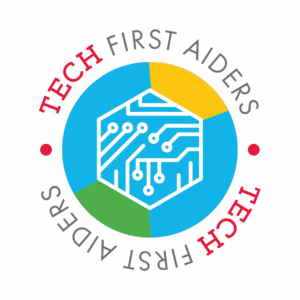
September 1st 2025
A Fresh Approach to Digital Confidence in Care
As technology plays an ever-larger role in social care, the Lincolnshire Care Association (LinCA) has stepped up with an innovative and timely solution: Tech First Aid Training. Designed to boost digital confidence and cybersecurity awareness across care settings, the project empowers nominated individuals from frontline teams with the skills, tools, and knowledge needed to thrive in a digital world.
Led by Damon Habbin (Digital Projects Manager) and supported by Frank Hanson (Falls and Remote Monitoring Programme Manager) and the wider LinCA team, the initiative identifies and upskills Tech First Aiders – staff champions who complete enhanced training and then support their colleagues in using digital tools and managing cyber security risk effectively and safely. This peer-to-peer support model is helping embed best practice at every level.
Backed by positive feedback and strong engagement, the project is laying the foundation for a more digitally resilient care sector in Lincolnshire.
From Funding to Future-Ready
The journey began with £30,000 in funding from the local Integrated Care Board (ICB), originally earmarked to improve digital security. Early events focused on cybersecurity proved both impactful and cost-effective, so much so that the team reinvested the remaining funds into expanding the programme into a full-scale, paper-free Tech First Aid training campaign.
This pivot marked a bold move: not just talking about digital transformation but living it. Care Providers were invited to nominate an individual from their organisation to attend two face to face training sessions delivered by LinCA. The aim of these sessions was to equip these individuals with enhanced digital and cyber security knowledge, enabling them to provide the peer-to-peer support previously mentioned.
An Interactive, Paper-Free Experience
Determined to lead by example, LinCA committed to running the sessions entirely paper-free, showcasing just how accessible and engaging digital tools can be. One standout feature was the use of Mentimeter, an interactive platform that allowed attendees to take part in live quizzes, polls, and feedback sessions.
From the start, Damon helped participants overcome digital hesitations by walking them through the tools in a friendly, hands-on way. The interactive elements made learning enjoyable, even for those with little tech experience and helped build confidence quickly.
What Did the Sessions Cover?
The training content covered in the two sessions was built around real-life needs and practical skills:
Cybersecurity & Spam Awareness
From password protection to recognising phishing emails, participants learned how to stay safe online and how to report threats effectively.
Remote Monitoring in Care
The sessions explored how care homes can take clinical readings and share them with health professionals in real-time, a growing trend that improves efficiency and safety.
AI in Social Care
One of the most exciting segments looked at how AI can enhance care, from chatbots and generative AI tools to creating personalised care plans and even writing induction materials. Attendees explored how these technologies could reduce admin and free up time for quality care, whilst acknowledging ethics and cyber security.
Business Continuity
The importance of having robust digital continuity plans was discussed in detail, ensuring providers are well prepared should the worst happen.
Digital Exclusion
Particular attention was paid to overcoming barriers in rural and coastal communities. Tools like free data schemes and support from organisations such as (a UK charity, providing specialist services and impartial support to create a digital world accessible to all) and the Good Things Foundationupporting organisations across the UK in providing free digital inclusion services to their communities) were shared as part of the solution.
Feedback and Real Impact
The response to the sessions was overwhelmingly positive.
‘Absolutely excellent course. Thank you for your dedication and commitment which has been evident in the quality of the contents you have delivered.’
Tech First Aid Delegate, May 2025
‘I have gained so much knowledge that I can take away and use in the workplace.’
Tech First Aid Delegate, May 2025
Through Mentimeter polls and recorded feedback, participants shared how the training made them feel more confident, informed, and excited to explore digital tools in their work. Visual materials and video highlights (pending approval) are being prepared to share the success more widely.
Recognising the Digital Champions
Certification and branding play a key role in the programme. Each Tech First Aider receives a branded certificate and digital badge, not just as a token, but as a professional endorsement. These credentials help boost confidence, celebrate achievement, and demonstrate the growing importance of digital fluency in social care.
Looking Ahead: A Blended Future
Given the programme’s success, LinCA is already planning a second wave of training. The next event, expected later this year, will adopt a blended learning format, combining in-person sessions with online webinars to support a new cohort of Tech First Aiders. In addition, targeted webinars will offer deep dives into key areas such as working with third-party tech suppliers and advanced business continuity planning, ensuring Tech First Aiders continue to add value to their organisations long after the initial training ends.
A Digital-Ready Workforce Begins Here
LinCA’s Tech First Aid initiative shows what’s possible when forward-thinking leadership, smart investment, and inclusive training come together. By blending practical digital tools with meaningful conversations and real-world care applications, the programme is more than just a course it’s a movement toward a more connected, protected, and confident care sector.
And this is only the beginning. With future sessions, additional resources, and growing momentum, LinCA is preparing for further growth of this programme.

Image by Ave Calvar on Unsplash
View all case studies